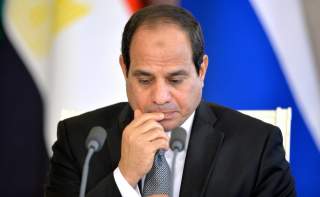America Can Exploit Saudi-Egyptian Tensions
Washington can butt in between Riyadh and Cairo.
If the U.S. links Russia’s bombings of moderate Syrian rebels to expanded Iranian influence and advocates a gradual transition away from Assad’s rule based on progress towards combatting terrorist groups, Egypt could consider supporting U.S.-led anti-ISIS efforts in Syria. As Egypt possesses extensive soft power in the Arab League, Cairo’s endorsement of Washington’s Syria strategy over Moscow’s would be a major triumph for U.S. policymakers. A U.S.-led anti-ISIS coalition consisting of Saudi Arabia, Egypt and the UAE would also be a formidable counterweight to the budding Russia-Iran-Turkey triumvirate. If this coalition remains cohesive, the United States could stymie Putin’s pro-Assad strategy.
Tensions between Egypt and Saudi Arabia have gifted the United States a historic opportunity to revitalize its alliance with Egypt. By acting as a mediator between Sisi and his GCC patrons, Washington can gain considerable leverage over Egypt’s counterterrorism policies and diplomatic activities. A stronger U.S.–Egypt alliance would deal a major blow to Vladimir Putin’s power projection ambitions in the Middle East and increase the United States’ soft power in the Arab League. It remains to be seen if U.S. policymakers have the strategic vision to capitalize on this opportunity, or if partisan gridlock will prevent the U.S. from taking full advantage of tensions between Egypt and the GCC.
Samuel Ramani is a DPhil candidate in International Relations at St. Antony’s College, University of Oxford. He is also a journalist who contributes regularly to the Washington Post and Huffington Post. He can be followed on Twitter at samramani2 and on Facebook at Samuel Ramani.
Image: President of Egypt Abdel Fattah el-Sisi. Kremlin.ru

